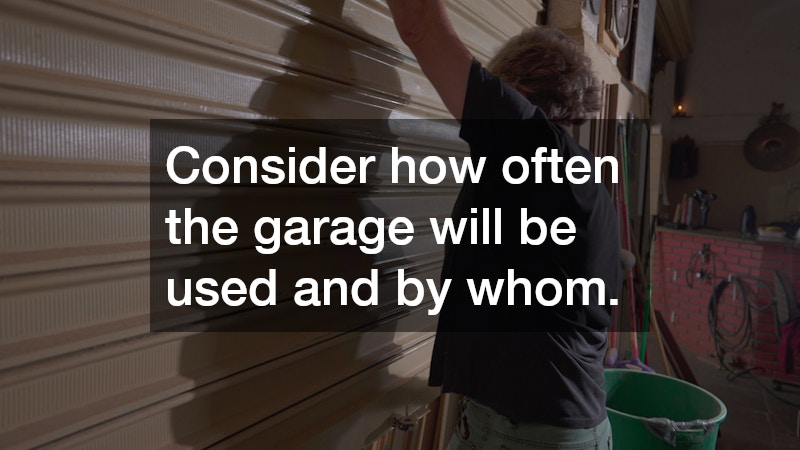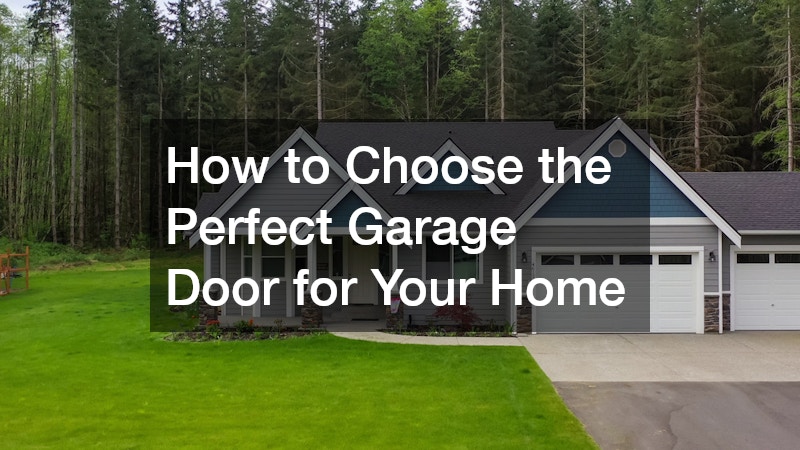A garage door is more than just a functional entryway; it’s a defining feature of your home’s exterior. Choosing the right one can dramatically enhance your property’s curb appeal, increase security, and even improve energy efficiency. However, with so many materials, styles, and features on the market, finding the perfect match for your home can be a daunting task. This guide breaks down the essential considerations to help you make a confident decision when selecting a garage door.
Consider Your Home’s Architectural Style
The first step in choosing a garage door is ensuring it complements your home’s architectural style. A modern, minimalist house may look best with a sleek, contemporary door made of glass and metal panels.
In contrast, a classic colonial or farmhouse design often benefits from a traditional, paneled wooden door with decorative hardware. Matching the door to your home’s overall aesthetic ensures a cohesive look that enhances curb appeal rather than detracting from it.
Pay attention to color and texture as well. Neutral colors like white, beige, or gray are versatile and can blend seamlessly with most exteriors. For a bolder statement, consider deep hues like navy, forest green, or charcoal, especially if they coordinate with shutters, trim, or front doors. Textures such as wood grain or faux wood finishes can add character without the high maintenance associated with natural wood.
Choose the Right Material
Garage doors are available in a variety of materials, each with distinct advantages and disadvantages. Steel doors are extremely durable and low-maintenance, making them ideal for homes in harsh climates. They can be insulated for better energy efficiency and are available in a range of finishes and styles. Aluminum doors are lightweight and resistant to rust, making them a good choice for humid environments, though they may dent more easily than steel.
Wood remains a popular choice for its natural beauty and warmth. While wood requires regular maintenance to prevent warping and decay, it offers unparalleled customization options for style and color. Fiberglass doors, though less common, are lightweight and resistant to cracking and denting. They also allow for unique textures and panel designs. When deciding on material, consider your climate, maintenance preferences, and budget.
Prioritize Security and Insulation
A garage door is a key entry point to your home, so security should be a top priority. Look for models with strong locking mechanisms and reinforced panels. Modern doors often feature smart technology, including remote access and monitoring systems, allowing homeowners to control and secure the garage from a smartphone or tablet.
Insulation is another critical factor, particularly if your garage is attached to the house or used as a workspace. Insulated doors help maintain consistent indoor temperatures, reducing heating and cooling costs while preventing condensation that can damage stored items. Insulation is measured by the R-value, which indicates the door’s resistance to heat transfer. A higher R-value is better for energy efficiency, but balance this with your budget and local climate needs.
Focus on Functionality and Features
While aesthetics, material, and security are essential, functionality should not be overlooked. Consider how often the garage will be used and by whom. If the garage is frequently accessed, investing in a high-quality automatic opener with a smooth, quiet operation is worthwhile. Modern openers often include battery backups, motion sensors, and smartphone connectivity, offering convenience and peace of mind.
Other features to evaluate include the door’s operation style, such as sectional, roll-up, or tilt-up designs. Sectional doors are the most common and offer reliable performance, while roll-up doors are ideal for garages with limited ceiling space. Tilt-up doors provide a unique, retro look but may require more clearance and manual effort unless paired with an opener.
Durability and ease of maintenance should also factor into your decision. Look for doors with weather-resistant finishes and rustproof hardware to minimize long-term upkeep. Additionally, consider warranties and service options, as these provide protection and peace of mind should any issues arise.
Selecting the perfect garage door for your home involves balancing style, material, security, insulation, and functionality. Start by analyzing your home’s architectural style and exterior colors, then choose a material that suits your climate, maintenance preferences, and budget. Don’t overlook the importance of security and insulation, which enhance safety and energy efficiency. Finally, consider operational features and ease of maintenance to ensure your door performs reliably for years to come.
By carefully evaluating each of these factors, you can confidently choose a garage door that not only elevates your home’s curb appeal but also provides long-lasting performance and peace of mind.

